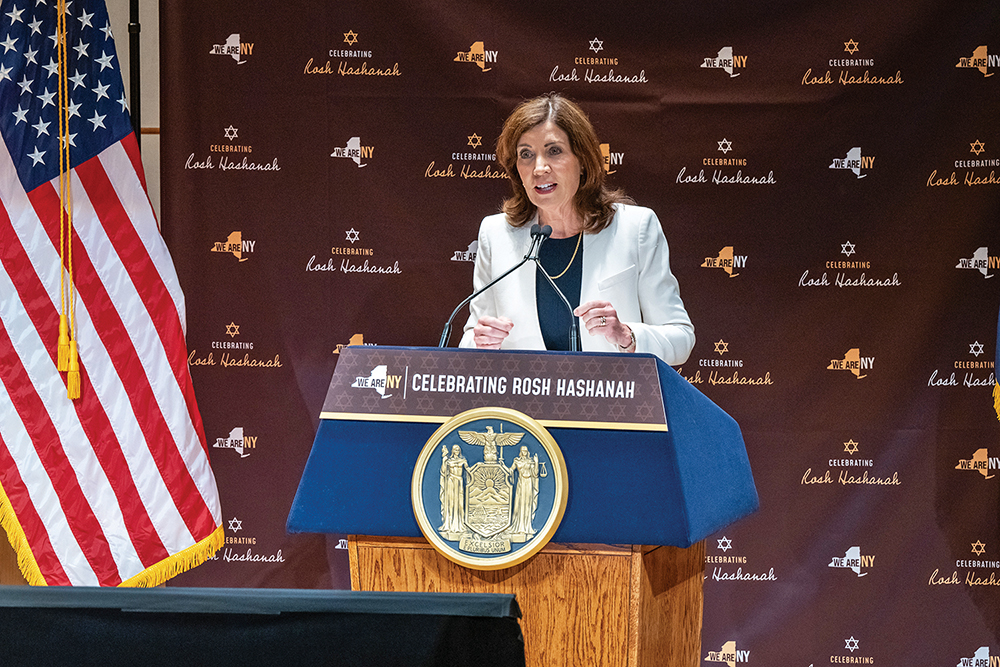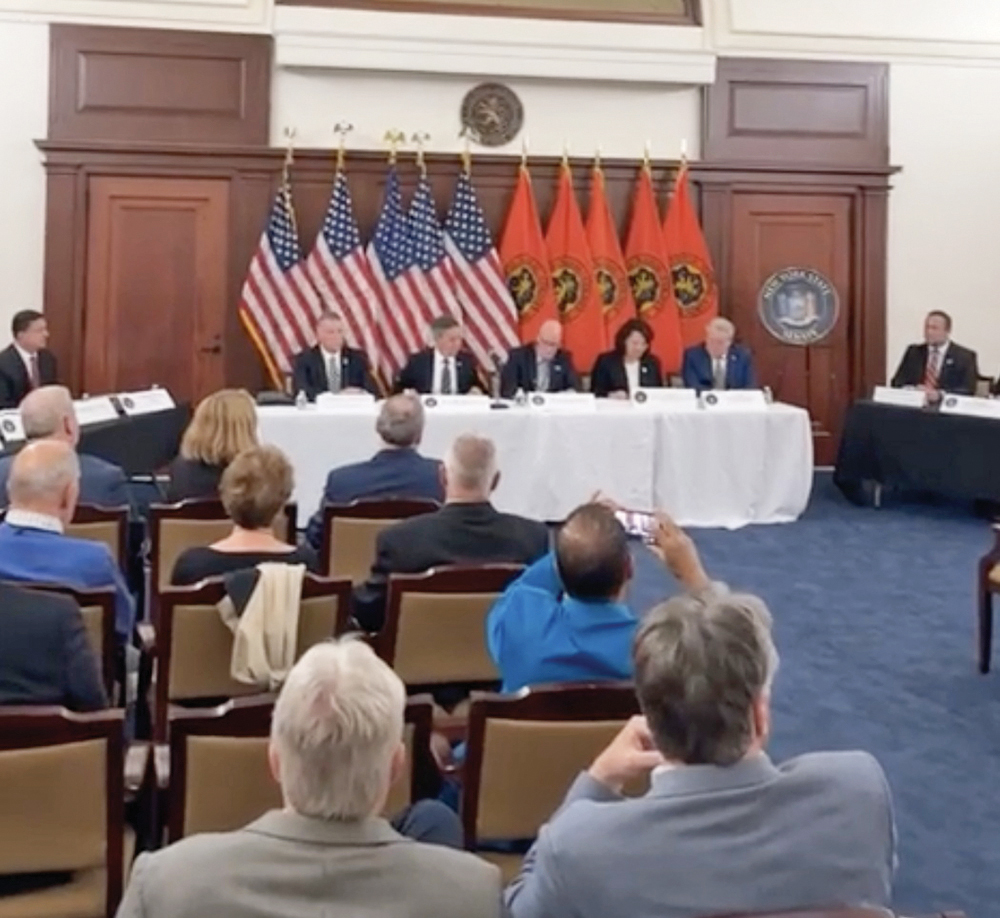
On Sept. 19, New York Gov. Kathy Hochul unveiled her plan to combat antisemitism during a program at the Center for Jewish History in Manhattan. Saying that Jews in New York are “under siege,” the governor stated that she wants them “to be able to walk without fear, to worship without anxiety, looking over their shoulder.”
An estimated 2 million Jews live in New York, among them are 40,000 Holocaust survivors.
In her address, Hochul said she met recently with a group of survivors who described how they had their childhoods snatched away. Those same survivors, the governor said, have told her they are seeing signs today that “bring back memories and worries about where we’re heading. I think we need to listen to those voices because they experienced human beings at their very worst.
“The statistics are not good,” Hochul continued. “The number of antisemitic incidents in the city have doubled in the last two years; that’s one antisemitic attack, physical, verbal every 33 hours.”
One of the main tenets of the governor’s proposal is the creation of a statewide “Anti-Hate in Education Center.” The working group will bring together officials from partner agencies, state and city universities, and government officials to combat hate in schools, and define hate and its impact on education. The group’s first “convening” will be in the summer of 2024 and will focus specifically on antisemitism.
Other aspects of her plan including improving the collection of hate- and bias-crime data; expanding support for victims of antisemitism and simplifying the state’s victims’ compensation applications—under the state’s Office of Victim Services some hate-crime victims are eligible for payments of between $500-$2,500 for lost or damaged property; and addressing mental health concerns among Jewish Americans by taking into account cultural and religious considerations and the impact of antisemitism.
Hochul also announced the allocation of $37.9 million in federal funding to 195 nonprofit organizations facing increased risk of terrorism to strengthen their facilities; most of the funding went to places in the New York City area. About $5 million went to organizations throughout the rest of the state.

Hochul’s announcement comes a few months after U.S. President Joe Biden set out a national strategy to counter antisemitism.
“We commend Governor Hochul for the concrete steps she is taking to combat the scourge of antisemitism in New York. Nothing is more important than education in promoting tolerance and battling hate and the Anti-Hate in Education Center is a most important tool to combat hate,” said Rabbi Yeruchim Silber, director of New York Governmental Affairs at the Agudath Israel of America, who attended the governor’s address.
“We are also grateful for the announcement that nearly $38 million will be distributed to nonprofit organizations throughout the state facing increased risk of terrorism and violent attacks. That, as well as the continuation of the $25 million allocation for Securing Communities Against Hate Crimes, will go a long way to assist these vulnerable targets in properly securing their facilities,” Silber continued.
According to the New York City Police Department, from January to June 2023, there were more than 100 hate crimes aimed at Jews in the city; while the Anti-Defamation League recorded 850 incidents statewide in 2022.
Michael Mittelman, Westchester Jewish Council board member and chair of the Combating Antisemitism committee, said, “Combating antisemitism requires a holistic approach that addresses education, security, intercommunal relations and the embracing of Jewish pride, among other areas. In that light, we welcome Gov. Hochul’s leadership in creating the New York State Anti-Hate in Education Center and Annual Convening to tackle rising incidents of antisemitism and send a clear signal that the Jewish community’s safety is a top priority.”
Bringing the conversation to the people, on Tuesday night, September 26, a small group of New York state senators sat in a meeting room on Long Island and listened for more than two and a half hours as Jewish community officials and local residents spoke out about antisemitism and how it is impacting Jews across the region and beyond.
One of the key questions of the night, as State Sen. Jack M. Martins said, is how do we bring the “same stigma” to antisemitism that there is to other forms of hate? Some speakers mentioned the need for better education—increased education about the Holocaust, education on the diversity of the Jewish people, and education on the history of Jews in America and not just a focus on Jewish tragedies.
Antisemitism today is based on the idea “that Jews are white colonizers with unbelievable power,” said one speaker. “Teaching Jewish history is important, but what happened before the Holocaust? What are Ashkenazim? What are Sephardim?” Others stressed the need for more action from government with concrete laws and steps to stop acts of Jew hate.
Noting the distribution of fliers that claim Jews are behind the covid virus or control the media, one attendee said, there needs to be “some sort of legislation” that would deter people from leaving the hate-filled papers on people’s cars and driveways.
The meeting was the most recent “listening” stop convened by the “Antisemitism Working Group,” a committee of five Republican state senators led by Martins, whose goal it is to come up with some concrete actions the State of New York can take to combat Jew hatred. Others in the group are State Sens. Patricia Canzoneri-Fitzpatrick, Joseph Griffo, Peter Oberacker and Bill Weber.
A similar listening event was held in Rockland County. One of those who spoke at that event was Rivkie Feiner, a community leader in Monsey.
“They wanted to hear personal stories, which we all have to share, and they wanted suggestions about what can be done,” said Feiner. “As Sen. Martins said so strongly and eloquently, ‘Why can you say things about the Jewish community that you can’t say about other communities?’ He’s right. We are treated differently, and it’s not a good thing.”
“Kol hakovod,” she added, “I was impressed by their thoughtfulness in doing this.”
One of the organizations that will be helping the state implement its plan is the American Jewish Committee, which also helped the federal government develop the national strategy to combat antisemitism.
According to Josh Kramer, the AJC’s regional director, a key area that AJC will be focusing on is education and training opportunities, noting the organization work in that arena on the college and university level and, increasingly, in high schools as well. In fact, he said, the organization is about to unveil a very limited pilot program in New York that will empower parents to deal with antisemitism at their children’s high schools.
Kramer’s colleague Marisa Bearak, associate director of AJC New York, stated, “In New York, where about one in 10 New Yorkers is Jewish, a proactive vision is needed to extinguish the flames of prejudice and foster a society where all can thrive without fear.”
Of the proposed plans, Feiner, the Jewish community member in Monsey said, “I feel we need all the help we can get. Is it perfect? Is it enough? It’s not there yet, but at least people are making an effort and trying.”
She added, “We have lots of problems when it comes to antisemitism, and we need a lot of solutions. I appreciate that both Republicans and Democrats are paying attention to the problem.”









